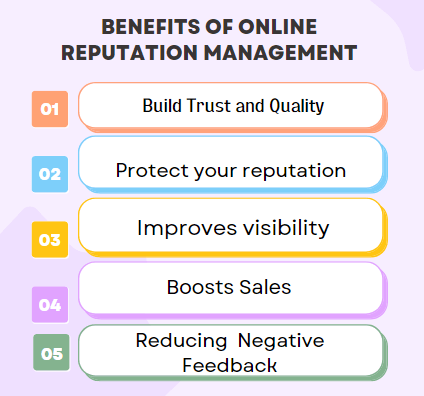Managing online reputation means controlling how people see a business online. This includes getting good reviews and responding to them, handling negative reviews and suppressing them. SEO and ORM companies help businesses improve their online image. As a result It’s essential in today’s digital world.
The Benefits Of Online Reputation Management

Importance of Reputation Management:
Individuals express their opinions about businesses daily through various channels such as ratings, comments, blogs, and social media posts. Negative feedback can devastate a business, leading potential customers to choose competitors. Maintaining a positive internet reputation is critical to both companies and individuals in today’s digital era. With the function of social media and online review platforms, information about websites is readily accessible. Even if a business is registered with Google, it may need help to be a user-friendly website.
Effective Reputation Management Strategies:
Perform a brand evaluation:
Examine every aspect of your brand, like logo and people’s thoughts. This ensures that your brand is consistent throughout and assists in identifying what is working and what needs improvement.
Analyze brand recognition:
Find out how well-known and lasting your brand is. Please look at where people discuss it and compare it with other brands.
Reply to negative comments:
Respond to criticism directed towards your brand. Make an effort to assist them and demonstrate your concern for their happiness.
Invest in SEO:
Pay money to increase the visibility of your website when people conduct online searches. This enhances website traffic and brand visibility.
Boost public relations:
Take steps to increase brand favorability, such as arranging events, speaking with journalists, and disseminating positive brand news.
Get testimonials from prior customers:
Inquire about the opinions of those who purchased from you. Positive reviews tell people you have a quality brand, and negative reviews can help you address issues.
Promote positive content:
Create and distribute content, such as amusing social media posts or customer success stories, highlighting how fantastic your brand is. This enhances the favorable opinion of your brand.
Suppress Negative Search Results
Good things you put online are shown first instead of bad things when you search for something. This is done to hide the bad stuff on the second page, where fewer people see it. Here’s what you can do to make the wrong things show up less:
Optimise Owned Articles:
Improve your articles to make them rank higher in search results. This involves using the right keywords and making them easily discoverable.
Create Social Profiles:
Create accounts for your brand on social media sites like Facebook and Twitter. This improves your online visibility and facilitates people’s ability to find you.
Publish New Websites:
Launch new websites related to your business to attract more attention online.
Contribute to Third-Party Websites:
Write articles or posts for other websites not owned by you. This helps expand your business’s reach to a broader audience.
Add Backlinks From Owned Assets:
Provide backlinks to your website from other online resources, like articles and social media pages. This promotes more people to visit your website.
Optimize for Featured Snippets:
Make your articles or website as search engine friendly as possible so they show up as quick answers at the top. This makes you more visible and raises the possibility that you will catch users’ attention.
Review Other Keyword Variations:
Explore different keywords that people use when searching online. Incorporate these keywords into your website or articles to improve your chances of being discovered by a wider audience.
Conclusion:
Managing your online reputation can be difficult if you’ve never faced criticism or reviews. Developing an SEO strategy is as important as responding to online criticism. Seeking professional assistance is necessary if things need to be going according to plan. To sum up, managing one’s online reputation is critical for companies operating in the digital field. It includes keeping a close eye on how people perceive your brand online, responding quickly to comments and reviews, applying good SEO tactics, and being prepared to consult an expert when necessary. Businesses that actively manage their online reputation can foster customer trust, maintain a positive image, and eventually grow in the ever-changing world of online commerce.
FAQ’s
What does managing online reputation involve?
Managing online reputation means keeping a close eye on what people are saying about you or your brand online, and taking action to address any negative comments or misinformation. It also involves promoting positive interactions and building credibility through various online strategies.
How can I handle my brand reputation on the internet?
You can handle your brand reputation on the internet by monitoring mentions, engaging with your audience, and addressing feedback promptly.
Are online reputation management and SEO identical?
Online reputation management and SEO are not the same; SEO focuses on search engine rankings, while reputation management is about shaping perceptions online.
Why is maintaining an online reputation significant?
Maintaining an online reputation matters because it affects trust and credibility. You can assess it by monitoring mentions and analyzing feedback.
What advantages do online reputation management services offer?
Online reputation management services offer expert monitoring, proactive strategies, crisis support, and help with SEO to maintain a positive online presence.

